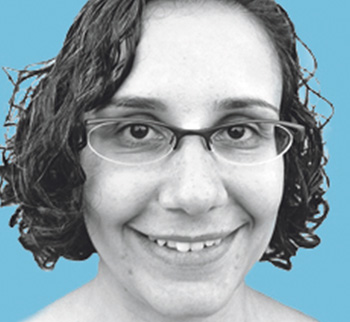Recently in the pages of The CJN, there has been debate over the rabbinic ordination of intermarried Jews. The question reminds me of the whole debate over intermarriage in general: it is too late. Just as intermarriage is an unstoppable force in our free and open society, intermarried rabbis are a natural consequence of both Jewish inclusion in the broader society and increasing openness in our own communities. How can either trend be a bad thing? There are already intermarried rabbis. I am one of them.
In my movement, Humanistic Judaism, we have always been welcoming and celebratory of intermarriage for many reasons, one being that we care about Jewish continuity. This may seem paradoxical, because most of us grew up hearing that intermarriage is the greatest threat to Jewish continuity. But it is time to stop debating what might happen as a result of intermarriage and start assessing what is happening. More and more Jews who are intermarrying are choosing to participate in Jewish life and raise children with a Jewish identity. However, the more barriers these families face, the more likely they are to withdraw.
We have a self-perpetuating problem where there are too few intermarried rabbis, and so rabbis continue to make decisions that negatively impact intermarried families. The debate over ordination of intermarried Jews underscores this. There is so much angst and concern over the kinds of decisions intermarried rabbis might make and how they would affect Judaism. So, again, rather than wondering, why not look at what does happen when rabbis intermarry?
I love and am fully committed to both my husband and my Judaism. I chose to be a rabbi for the same reasons that many rabbis choose this path: I am excited about Jewish life, I care about the Jewish community, and I want my work to be meaningful and of service to others. While my spouse is not Jewish, we share many of the same values. He is equally committed to the ideals of tikkun olam and tzedakah as I am (although he would use different language for those concepts), he cares about community and tradition, and he is committed to raising our daughter as a Jew, because he cares about me and knows it matters to me. Not only am I able to serve my community as a rabbi who lives a full and rich Jewish life, but I am able to serve as a model to our congregation’s many intermarried families. When I say that we are not only tolerant of, but celebratory of, intermarried families (for who wants to be merely tolerated?), people know they can take me seriously.
I officiate at many interfaith/ intercultural weddings. I work with couples to determine what aspects of Jewish culture and identity they wish to explore and, hopefully, make central to their lives. I know that people will choose to be and “do” Jewish if I can explain the value and significance of Judaism. My goal is both leading by example and by meeting these families where they’re at. There are no rules. The result is a much more open and dynamic engagement with Judaism and identity than a conversion of convenience would produce. What I offer is guidance about the challenges and joys of intermarried life. What I offer is knowledge, experience and leadership. That is what a rabbi does.
In my movement we have several intermarried rabbis. All of us live Jewishly at home. All of us have raised Jewish children. All of us advocate for being and doing Jewish in our own congregations and in the broader Jewish community. And all of us provide communal Jewish homes for families who have felt the sting of exclusion elsewhere. What might happen if more rabbis intermarry? We might create a Jewish community that is more inclusive, more dynamic and rich and, ultimately, more likely to survive and thrive.
Rabbi Denise Handlarski is assistant rabbi with Oraynu Congregation for Humanistic Judaism in Toronto.
